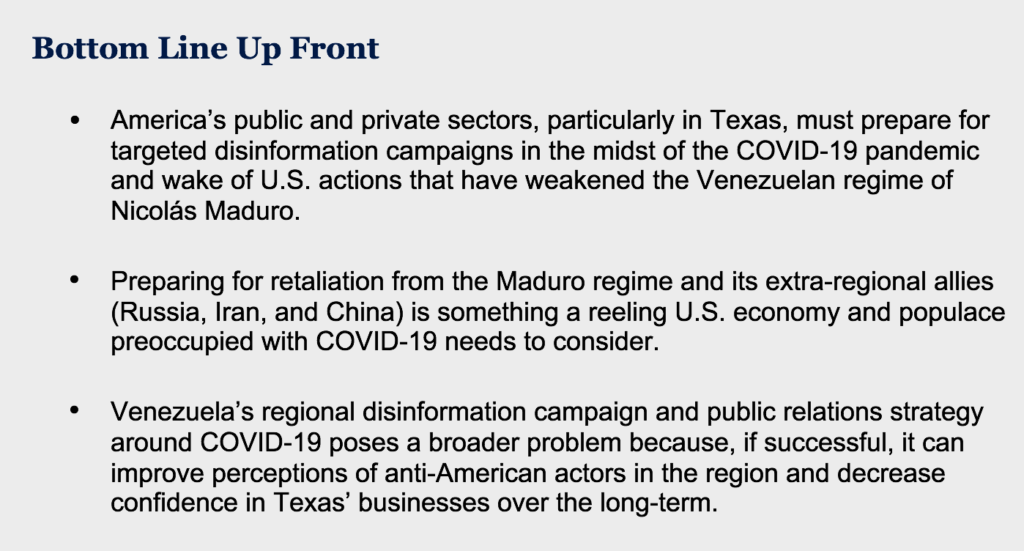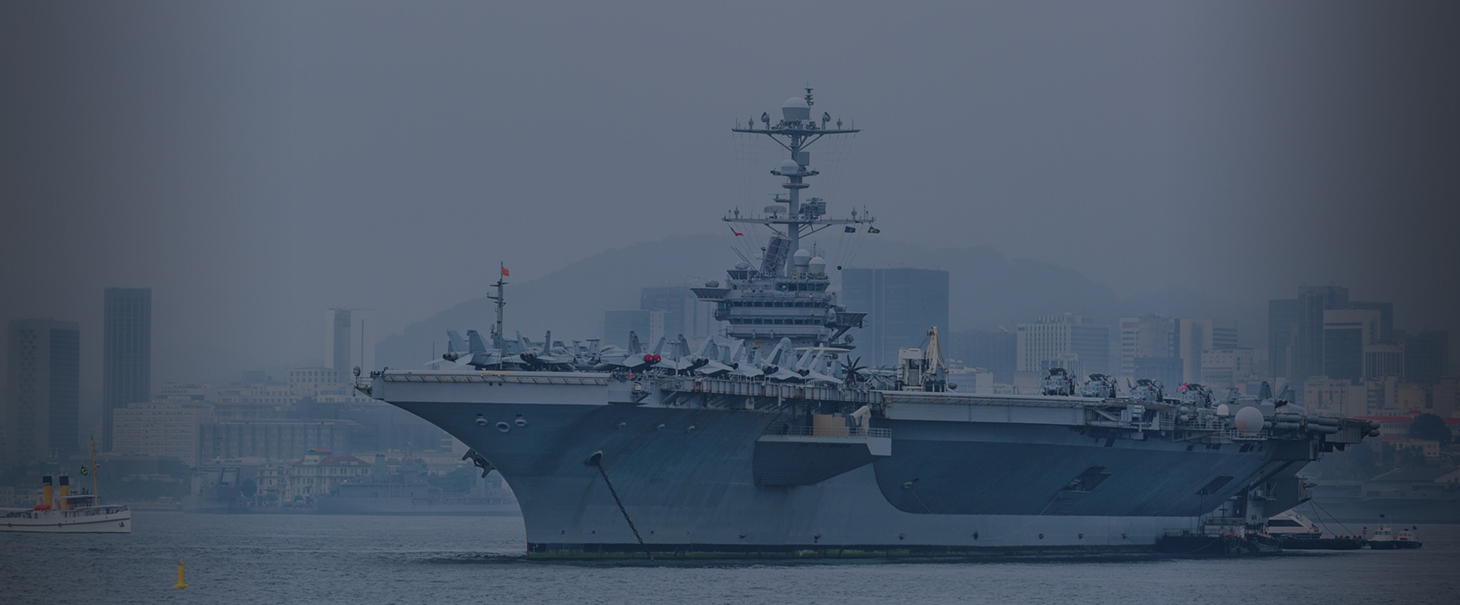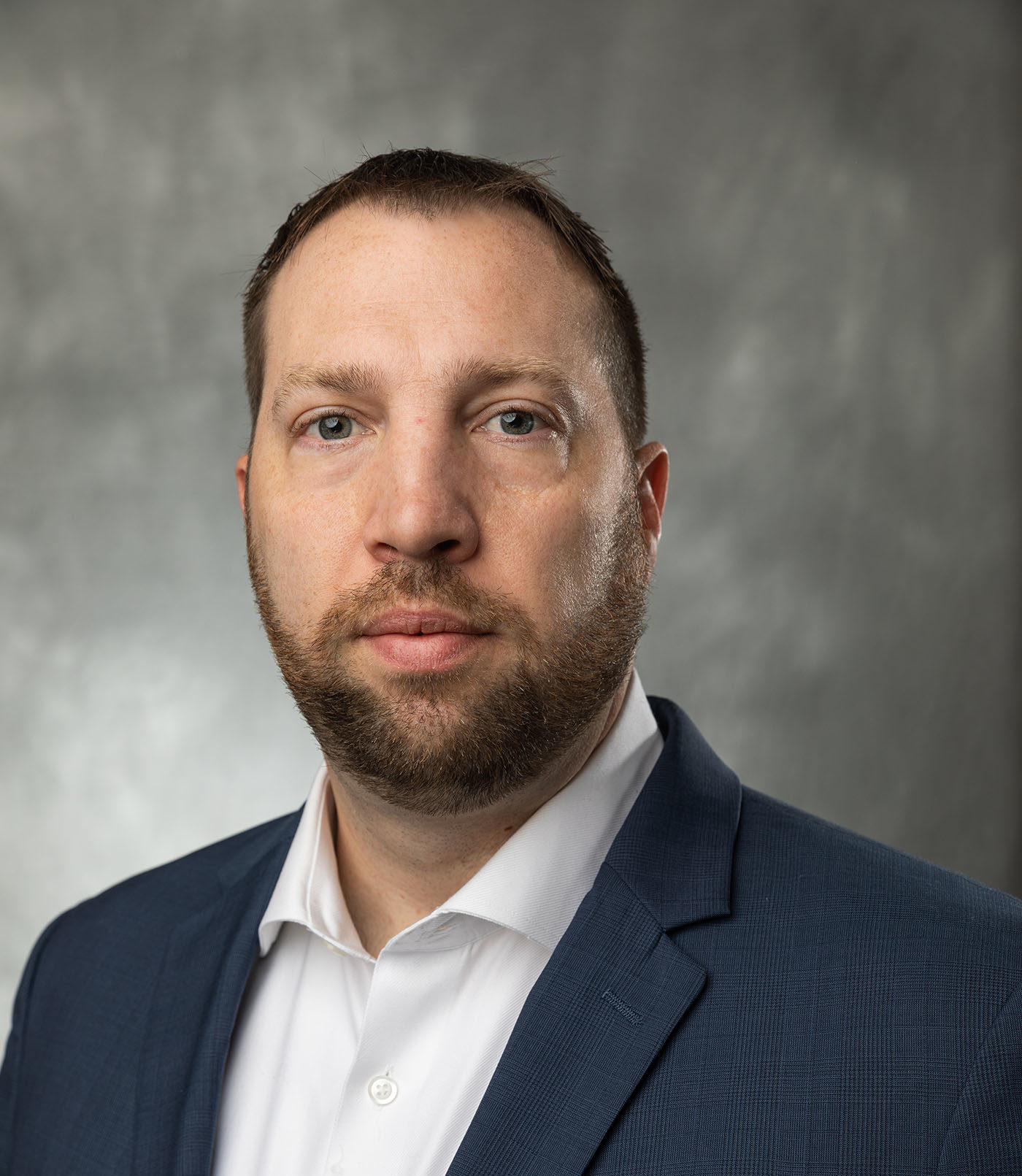EXPERT
Issues
Locations
DOWNLOAD
Transregional Threats Journal
Texas Series • Volume 1 • Issue 1
The Dangers of Venezuelan Disinformation Campaigns in the Era of COVID-19

Said the famous Chinese General Sun Tzu, “Foreknowledge cannot be gotten from ghosts and spirits…[and] cannot be found out by calculation. It must be obtained from people, people who know the conditions of the enemy.”
Sun Tzu, Art of War, trans. Thomas Cleary (Boston: Shambhala, 1988), page 172.
The Trump administration has taken significant action against the Maduro regime in recent weeks, indicting 15 regime officials for narcoterrorism followed by a robust counternarcotic operation along Venezuela’s Caribbean coast. At the time, the State Department introduced a proposal called the “Democratic Transition Framework” designed to resolve the crisis in Venezuela through a political transition for Nicolás Maduro.[1]
The narco-terrorist regime responded with local repression in Venezuela against mid-level opposition figures. However, it is the Venezuelan disinformation campaign tied to COVID-19 aimed at deceiving local populations in the Americas that may create the most problems for U.S. national security and economic interests south of the border.
Past behavior indicates future behavior
Latin America is key to the economic well-being of Texas and the United States. Mexico is the #1 trade partner of Texas, recording $109 billion in trade in 2018. Latin America represents $153 billion in trade for the Lone Star State – that is more than any other region in the world. Enormously important land-based supply chains that stretch from the southernmost parts of Latin America to the northern areas of the United States are responsible for 80% to 85% of that trade.[2]
Maduro knows this and has a history of weaponizing that which is available for exploitation.
The DOJ’s narco-terrorism indictments, announced on March 26th by Attorney General William Barr, revealed that Maduro and high-ranking Venezuelan regime officials deliberately deployed cocaine as a weapon to “devastate” American communities.[3] What the indictment did not mention is that those drug relationships include connections to the infamous Sinaloa cartel out of Mexico, who has reportedly taken over airstrips in the city of Machiques de Perijá in western Venezuela with the support of the Venezuelan military. The Mexican cartel is reportedly using the location as a transit point for cocaine shipments headed to American states, like Texas. Payment for use of Venezuela as a transit point has reportedly been laundered through Russian bank accounts tied to Tareck El Aissami, a high-ranking Venezuelan minister and economic vice president connected to the Iranian-backed terrorist group Hezbollah.[4]
Maduro’s history of weaponization extends to the displaced and disgruntled people he helped create. Recall that the Venezuelan regime coordinated logistics and helped finance organizers of the premediated migrant caravans from Central America that threatened America’s border security in 2018.[5] Evidence of financial support funneled through PDVSA – Venezuela’s state-owned oil firm – further linked the government to this highly coordinated, international effort that saw people from Congo, Bangladesh, and Somalia brought in to swell the caravans’ numbers.[6]
Maduro regime is now weaponizing COVID-19 through disinformation. The regime has amplified the propaganda of its VRIC supporters – a term used to describe the trans-regional threat network comprised of Venezuela, Russia, Iran, and China – and regional cohorts, like Cuba and Nicaragua. They have echoed China’s claim that the virus originated with the U.S. Army and parroted Iran’s claims that U.S. sanctions were preventing their countries from receiving COVID-19 supplies.[7]
Why COVID-19 disinformation campaigns
Experts at the Atlantic Council’s Digital Forensic Lab define disinformation as the purposeful spreading of false information with intent to mislead or harm, whereas misinformation is the unintentional spread of incorrect information. Much like a virus, though, disinformation can quickly mutate into misinformation as unwitting people repeat the propaganda.[8] Cold War Historian Calder Walton correctly states that unlike the costly and sophisticated disinformation campaigns of the Cold War, “all that is needed today…are bogus social media accounts and online trolls.”[9] The COVID-19 atmosphere of anticipation and speculation allows for false information to spread quicker than the virus.
Americans have heard that the fears of COVID-19 could be overblown. They also heard unbelievable death estimates related to the virus. Narratives changed, and continue to develop, at a constant rate.[10] The Texas governor issued a stay-at-home order April 3, 2020 after projected data pointed to a possible spike in cases sometime in the near future, which might overwhelm medical facilities.[11] Texas has witnessed a steady climb to 19,458 positive cases of COVID-19 in a state of 28 million people with 58 percent of Texas counties reporting no more than 5 cases.[12] The messages and policies notwithstanding, the speculation surrounding COVID-19 has created enormous uncertainty, which makes societies “easy prey for state and nonstate disinformation.”[13]
The Maduro regime, and its extra-regional allies, has already begun to exploit this opportunity and he is as practiced in disinformation as the United States is vulnerable to it.
The Maduro regime has the capability
The late Hugo Chávez, and now Nicolás Maduro, have perfected the regime’s control of the principle outlets of communication in Venezuela. The regime uses the National Telecommunications Commission (CONATEL) to censor radio and TV stations critical of the regime by blocking broadcast frequencies. A 2010 law allows for punishment of those who produce content that calls “legitimately constituted authority [of the Venezuelan regime] into question.”[14] Maduro now uses CONATEL to block and disrupt Venezuela’s booming social media presence, while utilizing the platforms for disinformation.[15] Meanwhile, crumbling infrastructure and intermittent electricity prevents citizens from having reliable access to digital media, inadvertently strengthening Maduro’s position.
Ultimately, though, Maduro owes his political longevity to the VRIC network and his regional supporters. Venezuela holds $100 to $120 billion in external debt – a significant portion of that is owed to Russia and China.[16] That debt equals nearly 75% of the total trade between Texas and Latin America. Naturally then, Maduro is doing their bidding by parroting China’s propaganda that the U.S. is manipulating the virus as a bioweapon.
In a national address in late February, as the virus was just beginning to spread in the United States, Maduro said there was “much global analysis that shows that the coronavirus could be a strain created for biological warfare against China.”[17] Maduro followed this up by calling for an investigation to determine whether the virus was a biological weapon. The regime’s local echo-chamber in Venezuela began repeating the same.[18]
This propaganda is not contained in Venezuela. The Maduro regime relies on a regional echo-chamber of state media from allied countries, such as Cuba and Nicaragua, and non-state social media to amplify these narratives. Among the most recent to go viral, is a quote from Maduro’s brother-in-arms, Evo Morales from Bolivia, who stated “I believe China won the third world war without firing a shot.”[19]
On the surface, Venezuela’s aggressive propaganda doesn’t seem serious enough to capture the “hearts and minds” of Latin Americans at a time of a pandemic. Nonetheless, the disinformation is complemented by “medical diplomacy” from China and Cuba, who combined with Venezuela, want to present themselves as the solution to COVID-19 and the U.S. as part of the problem.
Whereas victimization campaigns often pit governments against another, strategic influence operations are different in that they aim to deceive a population. The Maduro regime and the VRIC network in Latin America are using strategic influence to improve perceptions of China and decrease confidence in American interests and allies. Combined this is a direct threat to private enterprise and U.S. national security during this pandemic.
This matters for Texas
The Maduro regime currently claims only 204 infections of COVID-19 in a country of more than 28 million. Maduro has also claimed that a regime “doctor,” Sirio Quintero, had engineered a “natural brew” made up of medicinal plants that cured the disease.[20] He has tried reinforcing those fraudulent claims by offering medical assistance via China to U.S. regional allies like Colombia as a way of undermining American credibility.[21] China has already used medical supplies as soft power tools of influence in places like Argentina, Panama, and Mexico, while spreading propaganda that the virus originated with the United States.[22]
Concerning still, the same Sinaloa cartel that traffics cocaine into states like Texas through transit points in Venezuela is manipulating public opinion during COVID-19 by handing out much-needed supplies in places like Guadalajara inside boxes with the face of Joaquín “El Chapo” Guzmán emblazoned on them.[23] Feigned generosity is nothing new for Mexican cartels. It does demonstrate, though, how the VRIC, Mexican cartels, and the Maduro regime foster relationships that have a decidedly negative impact on the well-being of Texas.[24]
The Maduro regime’s relationships in Texas are not limited to second-hand associations with drug cartels. General Vladimir Padrino López is a regime insider and Maduro’s defense minister. Padrino used his position of power and illicit funds to build a web of private companies and real estate in the United States, one of which is called Trámites Consulares Inc., registered in Texas in 2010.[25] Padrino was recently indicted by the DOJ for allegedly taking bribes to allow aircraft to transport cocaine into the United States.
Meanwhile, Colombia and Brazil represent a regional bulwark against the Maduro regime and the VRIC. Brazil and Colombia are also two of the top trade partners of Texas, save for Mexico. The incredible complexity in converting raw materials into consumer goods like those imported from those countries, such as mineral fuel and organic chemicals, means Texas needs Colombia and Brazil.[26]
Those who stand to benefit from successful public relations disinformation of the Maduro regime and the VRIC are also those would threaten Texas’ economy and security. A strategy to navigate and thrive where hostile regimes aim to deceive relies on awareness and counter-messaging.
A counter-propaganda strategy
Resiliency is built through proactive strategies designed to monitor, respond, and share.
First, state institutions and private companies in Texas could consider employing a sliding scale of reaction, which will assist stakeholders in settling on a tailored response to any disinformation campaign. After all, some campaigns do not warrant a response, which might otherwise legitimize them. Others are a threat to safety and require an immediate response. Many fall somewhere in between.
Second, state institutions and private companies might also consider a content response strategy anchored by buckets of statistics, policies, and community relations. Facts undermine propaganda and statistical data, sharing of relevant company policies, and/or publicizing records of community outreach could help defeat fraudulent information in a timely manner.
Lastly, where it is prudent, national-level institutions (and federal agencies) would be wise to share intelligence and experience on disinformation campaigns. The indiscriminate nature of these campaigns means both American interests could suffer both direct and indirect consequences. Shared awareness is to the betterment of private enterprise and local uplift.
Notes
[1] Press Release, “Nicolás Maduro Moros and 14 Current and Former Venezuelan Officials Charged with Narco-Terrorism, Corruption, Drug Trafficking and Other Criminal Charges,” U.S. Department of Justice, March 26, 2020; Press Statement, “The United States Proposes a Framework for a Peaceful Democratic Transition in Venezuela,” U.S. Department of State, March 31, 2020.
[2] Data taken from the Office of the U.S. Trade Representative (USTR): https://ustr.gov/map/state-benefits/tx
[3] Press Release, “Nicolás Maduro Moros…”
[4] “Mexican Cartels – Venezuela’s Uninvited Guests Here to Stay,” InSight Crime, April 3, 2020; Emili J. Blasco, “Chavista Leaders received money from the Mexican narcos via Costa Rica,” ABC International, September 16, 2019.
[5] NTN24 interview of Douglas Farah “Las caravans de migrantes financiadas por Venezuela” on Efecto Naim, January 30, 2019.
[6] Secure Free Society, “Migrant Caravans,” National Press Club; Kristina Wong, “Guatemala Intel Minister: Migrant Caravans Are ‘Well-planned,’ Not Spontaneous,” Breitbart, February 13, 2020.
[7] Adam Taylor, “What coronavirus? With indictment of Venezuela’s Maduro and sanctions on Iran, U.S. doubles down on ‘maximum pressure,” The Washington Post, March 27, 2020.
[8] Atlantic Council’s Digital Forensic Research Lab, “Fake News: Defining and Defeating: Real Techniques for identifying fake news and disinformation,” Medium, January 19, 2018.
[9] Calder Walton, “Spies Are Fighting a Shadow War Against the Coronavirus,” Foreign Policy, April 3, 2020.
[10] John Thomas, “COVID-19 cases will hit ‘ten of thousands’ Texas Governor warns,” KXAN, March 22, 2020;
[11] Elaina Plott, “Can you Lead in a Pandemic Without Picking Sides? Greg Abbott Is Trying,” New York Times, April 4, 2020.
[12] Texas Department of State Health Services, Coronavirus Disease Dashboard. Last accessed April 20, 2020.
[13] Ibid. Walton, “Spies Are Fighting…”
[14] Reporters without borders, Venezuela. Last accessed on April 12, 2020 at https://rsf.org/en/venezuela.
[15] Ibid.
[16] “Venezuela’s Debt Problem: To Default or to Pay,” BBC, November 13, 2017; “World Fact Book,” CIA. Last accessed on April 13, 2020 at https://www.cia.gov/library/publications/resources/the-world-factbook/fields/246.html#VE;
[17] Jim Wyss, “As coronavirus lands in Latin America, Venezuela’s Maduro amps up conspiracy theories,” The Miami Herald, February 28, 2020.
[18] According to a CrowdTangle readout of social media engagement, many outlets linked to the Maduro regime in Venezuela, such as Con El Mazo Dando and Lechuginos, amplified the conspiracy theory that the U.S. is behind the coronavirus pandemic. Taken from the Atlantic Council’s Digital Forensic Research Lab.
[19] Frances Martel, “Bolivia’s Evo Morales on coronavirus: ‘China won the Third World War,” Brietbart News, April 14, 2020.
[20] Kejal Vyas, “Cow Dung, Garlic and a Prayer: The Fight Against Phony Cures for Coronavirus,” Wall Street Journal, April 7, 2020; Kim Lyons, “Twitter removes tweets by Brazil , Venezuela presidents for violating COVID 19 content rules,” Verge, March 30, 2020; Jeanfreddy Gutierrez, “Who is Sirio Quintero, the anti-vaccine “scientist” that Maduro endorsed?” Effect Cocuyo, March 24, 2020.
[21] Author interview with SFS fellows on April 8, 2020.
[22] Cassandra Garrison, “With U.S. hit by virus, China courts Latin America with medical diplomacy,” Reuters, March 26, 2020.
[23] Drazen Jorgic, “El Chapo’s Daughter, Mexican Cartels Hand Out Coronavirus Aid,” Thomson Reuters, April 16, 2020.
[24] Ryan Osbourne, “Cartel emerges as most dominant in North Texas,” Fort Worth Star-Telegram, October 18, 2017.
[25] Organized Crime and Corruption Reporting Project, “Venezuela military head has links to companies, real estate in U.S., Venezuela worth millions,” The Miami Herald, April 13, 2020.
[26] Texas Economic Development Cooperation. Last accessed on April 17, 2020 at https://businessintexas.com/global-markets/south-america; “Pompeo, Brazil’s new government target Cuba, Venezuela, Nicaragua,” Reuters, January 2, 2019.


 David Grantham, Ph.D.
David Grantham, Ph.D.